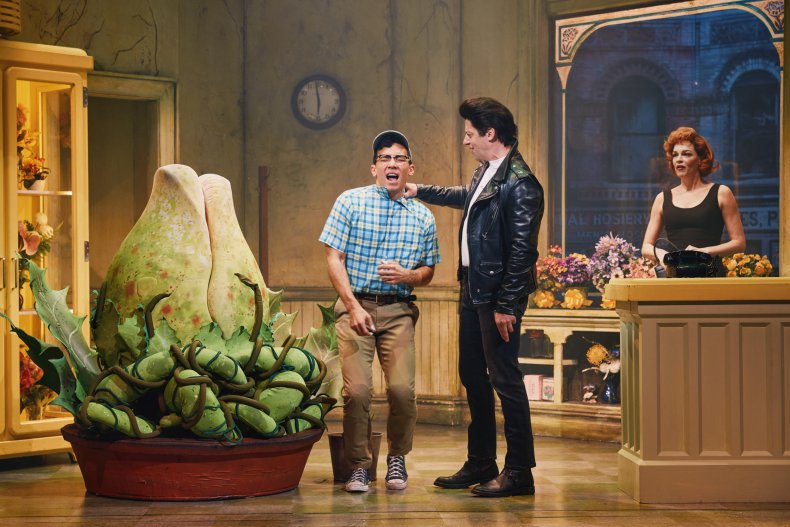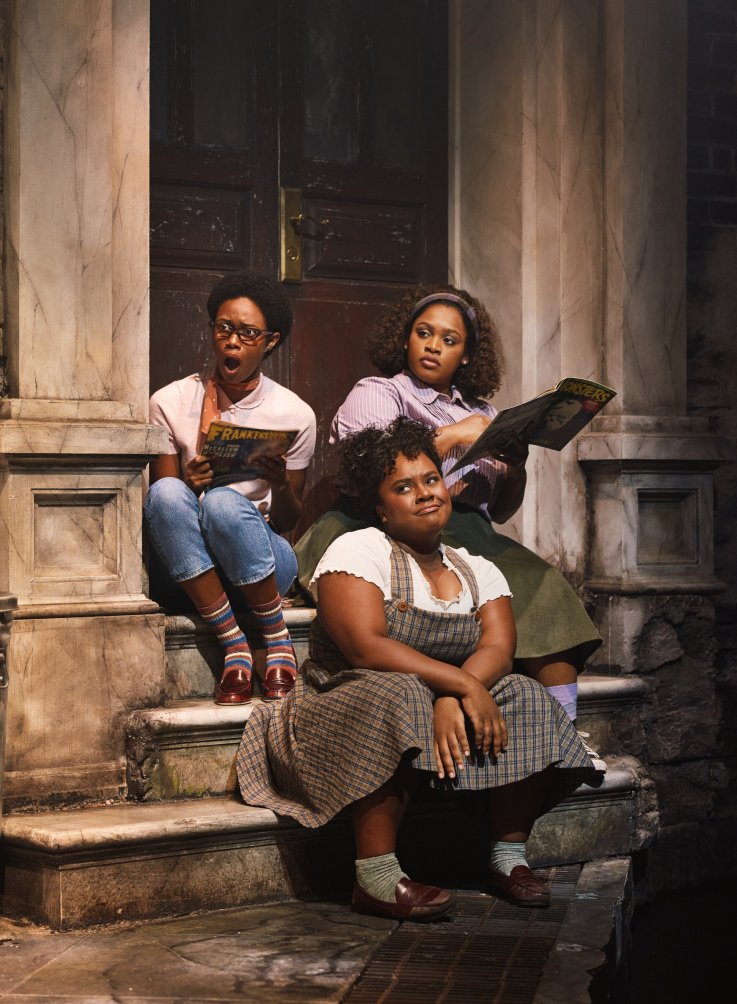On the sixth day of May in a year four decades before our own, the human race was faced with a little musical with no big-name stars. This little musical, Little Shop of Horrors, debuted in the most unlikely places: a little loft at 138 Fifth Avenue in New York, run by the WPA Theatre. (Note: This was not a holdover from the New Deal, but rather part of Workshop of the Players Art Foundation.) The show had a leading lady with green limbs, razor sharp teeth and a bass voice, and it took off-off-Broadway by storm.
Now, 40 years later, it is still going strong. After its stay on lower Fifth Avenue ended, it settled in for a commercial run at the Orpheum Theatre on Second Avenue in the East Village for five years. In addition to hundreds if not thousands of small theater productions around the world, Little Shop has since had a Broadway run and a concert staging, starring Jake Gyllenhall and original cast member Ellen Greene, as part of New York City Center's Encores! Off-Center series in 2015. And a new off-Broadway production is currently in its third year at the Westside Theatre in Hell's Kitchen. (Sorry landlords and developers: For this show, it's definitely Hell's Kitchen, not Clinton.)
As a sign of what this show has come to mean to New York, Mayor Eric Adams issued a proclamation that May 6 is "Little Shop of Horrors Day" in honor of the 40th anniversary of "this phenomenal musical and its incredible, positive impact on our live theater and entertainment sector."
So where does its staying power come from? First and foremost is its book. Librettos are often the weak link in a musical, sometimes slapped together on the fly in service of songs that have been shoehorned into was passes for a plot. But this Little Shop is a real improvement on its source material, the super-low budget 1960 movie directed by Roger Corman, a cult-classic that features a young Jack Nicholson. In it, a nebbishy-loser (the worst kind) makes a Faustian bargain (absolutely the worst kind) with a man-eating—and woman-eating, this is an equal opportunity predator—social-climbing Venus flytrap from outer space (the worst worst kind).
The songs are special too. Composer Alan Menken's music owes less to Rodgers and Hammerstein than it does to do-wop and Motown, and Ashman lyrics are as clever and funny as anyone's. Anyone who attends should listen carefully to the lyrics. Hopefully, the sound will be turned down low enough so you can listen to and savor the lyrics. And those who can't attend, should get a copy of a cast album and the script. The wordplay has not aged a bit in 40 years.

Director Michael Mayer is effusive about Ashman's talent. He said, "Howard was, and is, the mother lode. There is not a lyricist I've worked with who doesn't freely acknowledge that they follow in Howard's footsteps, and feel blessed to be doing so. He understood how to use musical vocabularies, and stylistic vocabularies, in a dramatic way that both forwarded the story and also brought in an homage to a certain time and sensibility. That always elevated the work—it elevated Little Shop, Beauty and the Beast, Little Mermaid and Aladdin. A Howard Ashman lyric just opens a door that's deeper."
Menken and Ashman were a great team. Their previous, equally offbeat, musical God Bless You, Mr. Rosewater has also become a cult classic. After Little Shop, the two went on to score some of the biggest animated hits of the 1980s and 1990s for Disney. Ashman's death in 1991 from AIDS was an incalculable loss to the musical theater world.
Little Shop is probably best when seen in smaller, grungier venues, which resemble its onstage setting. The Flatiron district, where I saw the showcase on May 7, 1982, was nowhere near the fashionable area it later became and the East Village could be downright scary. The setting was perfect birthing place for this skid row show.
At Home on Skid Row
The creators of this production firmly believe that staying true to Little Shop's origins is the key to success. In the '80s Ashman was reportedly asked to move it to Broadway and he refused. That decision has served the show well. Producer Tom Kirdahy, who saw the original off-Broadway production, told Newsweek, "My memories of the production at the Orpheum are so deeply ingrained. It was an instance of getting it right. And we were determined to take it back to Howard and Alan's vision, which was a kind of slightly grungy production in an intimate space."
Mayer, who also saw the original production, said, "During the original run in '82, the show was offered a Broadway transfer and Howard said 'no way.' There are elements of this show that will just feel wrong in a big theater. It's part of the ethos of this piece, that it sits in this intimate space."
Kirdahy first came to the show almost accidentally. He told Newsweek, "In 1982 I worked at NYU Medical Center, and I lived in the Weinstein dormitory, which is right off of Eighth Street and University Place. And I would walk from the Medical Center down Second Avenue back to my dorm across St. Marks Place. And I've always loved horror movies and I love musicals. I walked past the Orpheum Theatre, and I saw the marquee for this musical, Little Shop of Horrors, which I knew nothing about. And it just intrigued me. I just thought: Oh that looks really fun and up my alley. And I don't want to say that it changed my life, but it just attacked my nervous system in the most thrilling ways.
"I must have seen it at least five or six times. I just thought this thing is wacky and brilliant and funny and gorgeous and moving, and it just found its way into my heart, and I've loved it ever since."
Fast-forward a little over 30 years. Kirdahy, the husband of the late, great playwright Terrence McNally, had become a theater producer and the subject of a revival came up. He told Newsweek, "My partner Rob Ahrens called me one day and said 'I'd love to discuss a project with you.' And I said, 'OK, but just so you know, my slate is full. I have no time. And he said, 'OK. Well, at least let's meet for lunch.' We sat down, and he said, 'It's Little Shop of Horrors.' And I said, 'I'm in.'"
Honoring Ashman's Intention and the Spirit of the Show
Kirdahy continued, "Then I shared with him my history with Little Shop, and I said, 'I will only do this if we do it in a way that honors the spirit in which it was written and Howard's intention,' which was to keep it in an intimate space. And fortunately, the estate felt the same way. Howard's sister and his partner, Bill Loud, both felt the same. And Alan also thought that the best way to do Little Shop was in an intimate space.
"So, we all had a shared vision of how to move forward. And we knew that Michael Mayer is a huge fan of Little Shop and is a visionary director. He agreed with us, and from day one the journey was really very straightforward. People didn't believe us when we said that even if this gets rave reviews, we will never move it to Broadway. This is going to stay off-Broadway. And the morning after, when every review was a rave. We proved the integrity of our intentions by not keeping to temptation and by keeping it off-Broadway.
"We didn't go into it with any sort of greed or the idea of overreaching. I can honestly say that we produced this with integrity. We really felt confident that Little Shop is such a great piece that if we serve the art, the commerce will follow. That is indeed what happened.

"I think it's a perfect little musical, to be honest with you. It's deceptive, because every time I see it—and I've now seen it over a hundred times—I get something more out of it. You know it has survived the scrutiny of time and that's saying something. People find what they need to hear or feel when they see it. But the laughs are endless, and it manages to really touch people's souls in a very meaningful way."
There have been many Seymours since Lee Wilkov originated the role. In addition to Gylenhaal in concert, Jonathan Groff and Jeremy Jordan and Conrad Ricamora, have played the role. Other Audreys besides Greene include Faith Prince, Annie Gulden and Tammy Blanchard. And there have been many Audrey Twos after the wonderful deep-voiced Ron Taylor, though this company has a woman who understudies the role, likely the first woman to do so in a major production.
After 40 years, the roots of this little show's staying power are as deep as Audrey Two's. With music and lyrics as clever and catchy, it will remain popular for a long time. And as long as there are nebbishy-nerds willing to make a deal with the devil in the person of a people-eating plant all for a little fame and fortune and a pretty woman, it will be as relevant as the day it debuted.
The Link LonkMay 08, 2022 at 07:05AM
https://www.newsweek.com/little-shop-horrors-still-going-strong-off-broadway-40th-annivesary-1704537
After 40 Years, 'Little Shop of Horrors' Is Still Going Strong—Off-Broadway - Newsweek
https://news.google.com/search?q=little&hl=en-US&gl=US&ceid=US:en

No comments:
Post a Comment